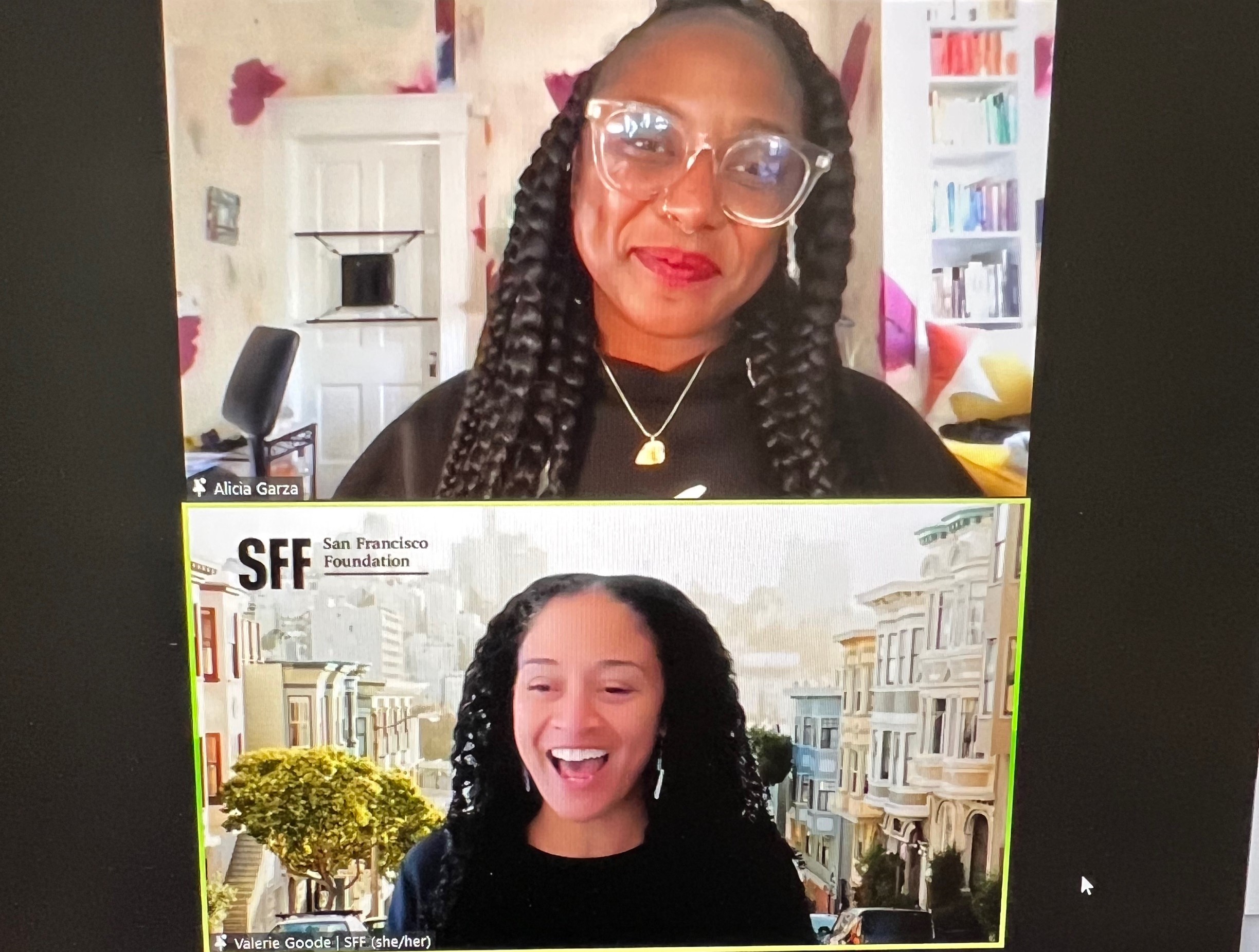To advance equity, “we need to deepen our ability to write, win, and implement policy in cities and states,” advised Alicia Garza, principal of Black Futures Lab and co-founder of #BlackLivesMatter. And to make this happen, we need a robust, healthy movement where women of color are powerful and influential in politics.
“Often women of color elected are the only or the first,” Garza said. “They are not networked. How dope would it be if Black women officials moved a policy agenda together?” Garza’s point of view amplifies the need to invest in programs like SFF’s Women of Color, Women of Power which supports women in leadership in the Bay Area.
SFF hosted a webinar on October 27, 2022, with special guest speaker Alicia Garza, who shared intimate and moving stories about her mother, explained the power of story and narrative, and observed specific details about organizing in San Francisco’s Bayview District. A formidable leader, Garza is principal of Black Futures Lab, political strategist, organizer, and author. With a mix of a humble spirit and riveting ideas, Garza also made a case for self-reflection, developing deep multi-racial relationships, and exhorted women of color to become policymakers or, as she said, rule makers. Facilitated by SFF’s Chief Marketing Officer Valerie Goode, the webinar featured four community members who posed their questions to Garza.
Asked why she wrote her 2020 book, The Purpose of Power: How We Come Together When We Fall Apart, Garza responded, “I wanted to leave some breadcrumbs in the forest for anyone who wants to be a part of making change,” she said. “It represents a snapshot of what we were grappling with, thinking about.” After the 2016 election, she added, hoping that others will write first-person accounts and create a written conversation that can last much farther.
Garza’s mother features prominently in the book, and she speaks lovingly about her mother’s struggles, noting that “my mom taught me almost everything about what I value and how I show up for what I value.” What’s useful, she noted, is for each of us to examine how we first made sense of the world. Garza also urged us to reflect on “how those ideas help shape what we think is possible for us or not. And how does that worldview shape the work that we do now? And what our particular contribution or role might be?” She argues that self-reflection and healing were transformative aspects of Garza’s writing experience and are critical steps for all changemakers.
Questions from guest community members
Katherin Canton, Race and Equity Manager at the California Arts Council and an alumnus of LeaderSpring Center’s LeadStrong Fellowship Program asked: What would you say to leaders in the social sector who do not yet see themselves as “activists” but who have chosen to work hard to make a difference in the lives of low-income communities of color? Garza’s response was inclusive: “If you’re not an organizer, you’re still engaging and contributing to movements,” she said. Acknowledging that there are people who want to identify as an organizer but that it’s not necessary for impact, community members should feel that” you’re making contributions through your work, even if it’s not movement organizing.”
Brandie Bowen, Children Making a Change (CMAC) Lead Organizer at Coleman Advocates asked: What are your thoughts on building and maintaining local political power when Black and Brown people are being pushed out of cities like San Francisco? Garza referenced her long tenure and deep experience organizing for the dwindling Black community in the Bayview District of San Francisco.
“There just wasn’t a depth of understanding about why it was important to deepen the bench, in particular in Black communities, because we were being hemorrhaged from that city and still are being hemorrhaged from that city. What it meant… was that our representation was shallow.”
Chala Bonner, Civic Engagement Organizer at Safe Return Project asked about the types of challenges and opportunities that Garza experienced as her public image has evolved over time. Noting the need to be courageous, Garza urged, “Don’t be afraid to take up space, if you’re at the stage to take over the infrastructure, do it.” She was also realistic about being both loved and hated on. Her advice was to “stay anchored and remember who you are accountable to.”
“Women of color are beginning to get elected across the Bay Area,” observed BK Williams, Co-Chair of the Richmond Progressive Alliance. Williams asked: “What do you think the challenges, opportunities, and gaps are to ensure these wins translate into better quality of life for low-income communities of color? ” A lot of folks in power don’t know how to govern,” Garza responded. She identified several gaps, including that many elected officials simply don’t know how to write or understand policy, nor have an understanding of data and need communications and media training and preparedness.
In closing, Yolanda Alindor referenced the dearth of women of color leaders in the Bay Area and SFF’s partnership with the LeaderSpring Center on our Women of Color, Women of Power program. This year-long training program is currently recruiting participants, and information is available at LeaderSpring Center.
SFF also hosts a Lunching with Leaders series featuring outstanding women of color leaders from around the Bay Area. For information on the Lunching with Leaders series or to donate to our women of color leadership programs, please visit sff.org/WOC or email us at [email protected].
Watch a recording of the event to catch the full flavor and power of this session.


